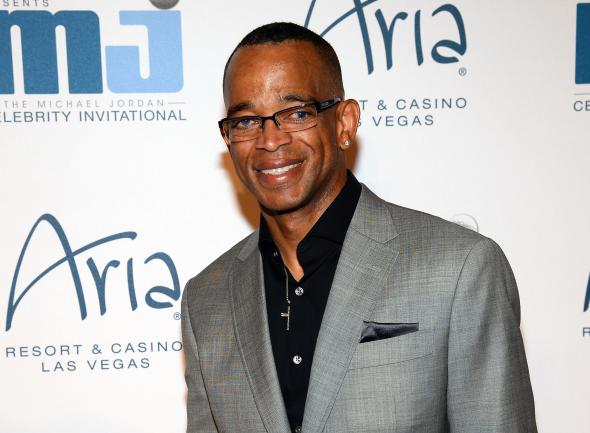How Stuart Scott Made Booyah His Own

Photo by Ethan Miller/Getty Images for Michael Jordan Celebrity Invitational
The obituaries for ESPN sportscaster Stuart Scott have inevitably focused on one word as an emblem of his exuberantly slangy style: Booyah!
Scott peppered his SportsCenter highlight rundowns with many signature catchphrases, from the admiring "cool as the other side of the pillow" to the preacherly "Can I get a witness from the congregation?" But within a few years of debuting on ESPN in 1993, "Booyah!" had become Scott’s calling card, his joyful punctuation mark for a particularly dramatic slam-dunk, homer, or touchdown.
Eventually it was also ripe for parody. Consider the March 1999 Saturday Night Live sketch in which Tim Meadows plays Scott welcoming an excitable new anchor, played by Ray Romano, to the SportsCenter desk. After Meadows-as-Scott drops numerous booyahs, Romano’s character gamely inserts his own catchphrase attempts, like "Sweet sassy molassy!"
As Stephen A. Crockett Jr. pointed out on The Root—as did Jeremy Stahl right here in his Sports Nut piece—"Booyah!" was indicative of the way that Scott injected the language of hip-hop into ESPN’s typically whitebread sportscasts. Before Scott brought it into the mainstream, "Booyah!" had been chiefly associated with the West Coast rap scene, an onomatopoetic imitation of gunfire that got extended into a signal of surprise, aggressive strength, or delight.
The earliest examples of booyah (also spelled boo-yah, boo-ya, boo-yaa, boo-yeah, etc.) are all clustered in Los Angeles. (It’s not to be confused with another booyah, a kind of stew popular in the Upper Midwest, or with the Navy SEAL battle cry, "Hooyah!") When UCLA undergrads in the late ’80s were asked to define the word by linguistics professor Pamela Munro, they came up with "wham, bang, crack," as in, "The car hit us and booyah, my head flew into the windshield."
In 1989, Tone Loc, who had forsaken L.A.’s gang life for a rap career, slipped the word into a song on his hit album Loc-ed After Dark. "My rhyme is like booyah but it’s not dope / And I’m the type of MC to make all lose hope," he rapped in "Don’t Get Close." Oxford University Press language technologist Matt Kohl, who runs the website The Right Rhymes, suggests that he was playing off two secondary meanings of booyah: "(something) excellent" and "marijuana."
The word first showed up in print in a January 1989 Los Angeles Times article about gang members getting charged with intimidation under California’s Street Terrorism Enforcement and Prevention Act. One had allegedly threatened a sheriff’s deputy by flashing a gang sign and saying, "It’s the last thing you’ll see in the back window of your car before you hear ‘booya, booya.’ " " ‘Booya’ is gang slang for gunfire," the newspaper explained.
California gangsta rappers soon solidified this as the primary meaning. Leading the way was a group that had the word in its very name: Boo-Yaa T.R.I.B.E., six Samoan brothers from Carson, in L.A.’s South Bay. One brother, Gawtti, would later explain that booyah was neighborhood slang for the sound of a shotgun, "so we used the term to describe the impact of us on stage, blowing people away."
On their 1990 debut album, New Funky Nation, the T.R.I.B.E. exulted in all manner of booyahs. The first track, "Six Bad Brothers," uses the word metaphorically: "I don’t need an application for this rhyme creation / A booyah to ya with the rhyme reputation." The second track, "Rated R," is more literal: "Booyah! It means a cry from a shotgun."
Other L.A.-area rappers continued popularizing booyah in the early ’90s, especially the group Cypress Hill. In 1991, they worked it into four different songs on their self-titled debut, including the single "Hand on the Pump": "Lettin' out a bullet, this is goin' booyah."
Athletes started getting in the booyah game, too. In 1992, when the Orange County Register asked defensive tackle Doug Reed if he was bitter about getting cut by the Los Angeles Rams, he compared himself to a boxer. "Even if I was mad, I wouldn’t telegraph it," Reed said. "I’d have my hand behind me like this, and then when I saw an opening—booyah. That’s when I’d strike."
And a few years later, a fictional football player memorably used the word: Rod Tidwell, Cuba Gooding Jr.’s character in Jerry Maguire, yells, "Booyah! Touchdown! I make miracles happen!"
But by that time, booyah had already become firmly linked to Scott and his spirited play calls. Tony Kornheiser (long before he became a regular face on ESPN) tipped his hat to the word in a 1996 Washington Post column: "As they say on SportsCenter: Boo-yah!"
When students at Michigan’s Hope College compiled their "Dictionary of New Terms" in the late ’90s, Scott’s impact was undeniable. They defined booyah as an interjection used "to express a feeling of domination by an individual who has just done something significantly good, while competing against another individual, especially in sports or video games."
Scott eased off the booyah! after its ’90s heyday. (Perhaps the SNL sketch played a role in that.) Others have adopted it, notably Jim Cramer on CNBC’s Mad Money. But as the #booyah hashtag trended on Twitter yesterday after news spread of Scott’s death, it was clear that the word had become his lasting legacy.
Follow @lexiconvalley on Twitter or on Facebook.